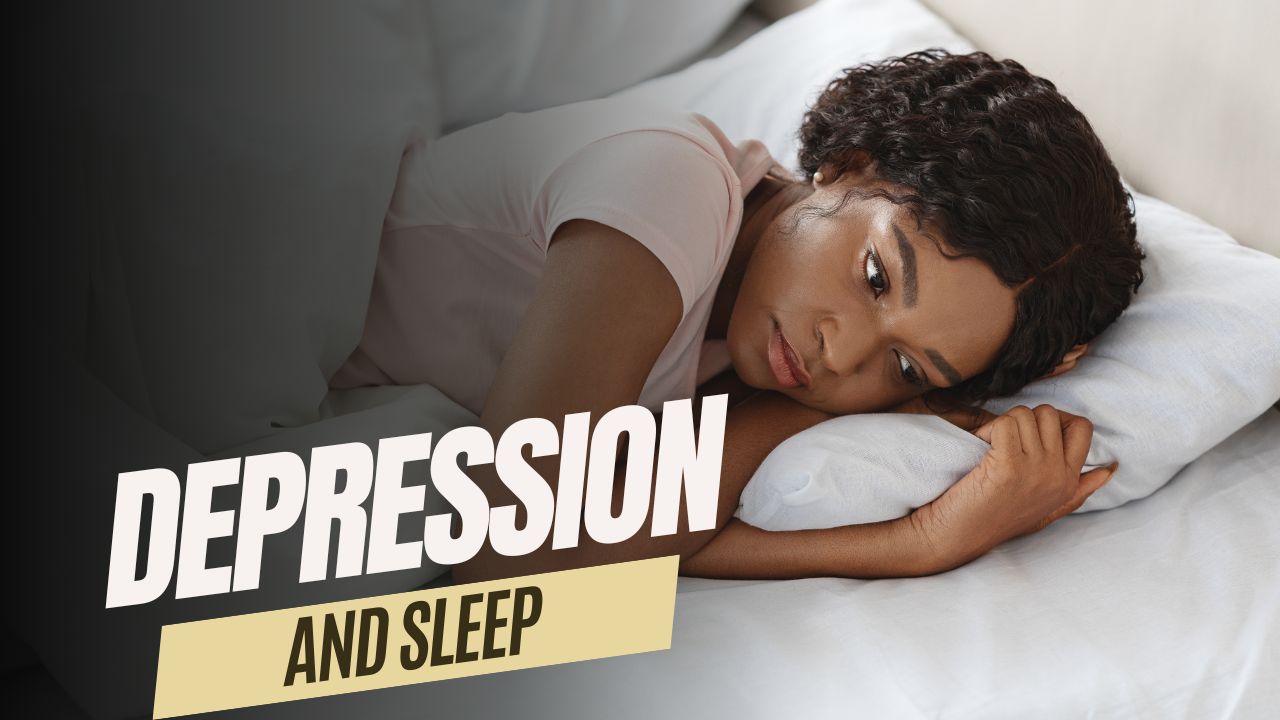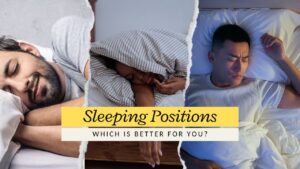Sleep and mental health are closely interconnected. Depression, one of the most common mental health disorders, significantly affects sleep habits and quality. In turn, poor sleep can exacerbate the symptoms of depression, creating a vicious cycle that’s challenging to break. This blog post will explore how depression impacts sleep, cite scientific studies, and provide practical solutions to improve sleep quality, even when dealing with depression.
The Link Between Depression and Sleep
Depression can cause a variety of sleep-related issues. People with depression often experience:
- Insomnia:
Difficulty falling asleep, staying asleep, or waking up too early are common symptoms of insomnia. According to a study published in Dialogues in Clinical Neuroscience, about 75% of people with depression suffer from insomnia (Riemann et al., 2009). This condition can lead to a decrease in total sleep time and a feeling of restlessness throughout the night. - Hypersomnia:
On the opposite end of the spectrum, some people with depression experience hypersomnia, which is excessive sleepiness or prolonged sleep. Research in the Journal of Affective Disorders suggests that around 40% of young adults with depression may experience hypersomnia, leading to long sleep durations and difficulty waking up in the morning (Kaplan & Harvey, 2009). - Poor Sleep Quality:
Depression can disrupt the natural sleep architecture, leading to poor sleep quality. A study in Sleep Medicine Reviews found that depression often results in reduced slow-wave sleep (deep sleep) and rapid eye movement (REM) sleep disturbances, which are critical for restorative sleep (Baglioni et al., 2016). - Sleep Fragmentation:
Frequent awakenings during the night, known as sleep fragmentation, are common in individuals with depression. This disrupted sleep can result in feeling tired and unrefreshed upon waking, even if the total sleep time seems adequate.
How Depression Alters Sleep Patterns
Depression affects sleep through several mechanisms:
- Neurotransmitter Imbalance:
Depression is associated with imbalances in neurotransmitters such as serotonin, norepinephrine, and dopamine. These chemicals play a crucial role in regulating mood and sleep. A disruption in these neurotransmitters can lead to sleep disturbances and alter the natural sleep-wake cycle (Srinivasan et al., 2012). - Increased Cortisol Levels:
Cortisol, the stress hormone, is often elevated in individuals with depression. High cortisol levels can lead to increased alertness and make it difficult to fall asleep. Research in the American Journal of Psychiatry shows that individuals with depression have higher evening cortisol levels, which can interfere with the ability to relax and sleep (Buckley & Schatzberg, 2005). - Rumination and Anxiety:
Depression often involves excessive rumination—repeatedly thinking about distressing events or worries. This mental activity can make it hard to relax and fall asleep. A study in Behavior Therapy highlights that individuals who ruminate are more likely to experience insomnia and poor sleep quality (Carney et al., 2010).
The Impact of Poor Sleep on Depression
Poor sleep doesn’t just result from depression; it can also worsen depressive symptoms. Chronic sleep deprivation affects the brain’s ability to regulate mood and emotion, leading to increased irritability, anxiety, and even suicidal thoughts. A study published in Sleep found that individuals with insomnia are ten times more likely to develop depression than those without sleep problems (Baglioni et al., 2011).
Practical Solutions to Improve Sleep While Managing Depression
- Establish a Consistent Sleep Schedule:
Go to bed and wake up at the same time every day, even on weekends. Consistency helps regulate your body’s internal clock and improves sleep quality. - Create a Relaxing Bedtime Routine:
Engage in calming activities before bed, such as reading, listening to soothing music, or practicing relaxation techniques like deep breathing or meditation. This can help signal to your body that it’s time to wind down. - Limit Exposure to Blue Light:
Blue light from screens (phones, tablets, computers) can interfere with melatonin production, making it harder to fall asleep. Avoid screens at least one hour before bedtime, or use blue light blocking glasses if you must use electronic devices. - Exercise Regularly:
Physical activity can help improve mood and promote better sleep. Aim for at least 30 minutes of moderate exercise most days of the week, but avoid vigorous exercise close to bedtime as it may be stimulating. - Create a Comfortable Sleep Environment:
Your bedroom should be a sanctuary for sleep. Ensure your mattress and pillows are comfortable, the room is dark, quiet, and cool. Consider using blackout curtains, white noise machines, or fans to enhance your sleep environment. - Cognitive Behavioral Therapy for Insomnia (CBT-I):
CBT-I is a highly effective treatment for insomnia and has been shown to improve sleep in individuals with depression. It involves identifying and changing negative thoughts and behaviors related to sleep. - Seek Professional Help:
If sleep problems persist, it’s essential to seek help from a healthcare provider. A mental health professional can provide therapy, prescribe medication if necessary, and offer strategies to manage both depression and sleep disturbances.
Conclusion
Depression can have a profound impact on sleep habits and quality, leading to insomnia, hypersomnia, poor sleep quality, and sleep fragmentation. The interplay between sleep and depression creates a cycle that can worsen both conditions. By understanding the connection between depression and sleep and implementing practical solutions, it is possible to improve sleep quality and overall well-being. Remember, prioritizing sleep is not just about feeling rested; it’s an essential component of managing mental health and improving quality of life.
References
- Baglioni, C., Battagliese, G., Feige, B., Spiegelhalder, K., Nissen, C., Voderholzer, U., … & Riemann, D. (2011). Insomnia as a predictor of depression: A meta-analytic evaluation of longitudinal epidemiological studies. Journal of Affective Disorders, 135(1-3), 10-19.
- Baglioni, C., Regen, W., Teghen, J., Spiegelhalder, K., Feige, B., Nissen, C., & Riemann, D. (2016). Sleep changes in the disorder of major depression. Sleep Medicine Reviews, 30, 51-62.
- Buckley, T. M., & Schatzberg, A. F. (2005). On the interactions of the hypothalamic-pituitary-adrenal (HPA) axis and sleep: Normal HPA axis activity and circadian rhythm, exemplary sleep disorders. Journal of Clinical Endocrinology & Metabolism, 90(5), 3106-3114.
- Carney, C. E., Harris, A. L., Moss, T. G., & Edinger, J. D. (2010). Distinguishing rumination from worry in clinical insomnia. Behavior Therapy, 41(4), 470-482.
- Kaplan, K. A., & Harvey, A. G. (2009). Hypersomnia across mood disorders: A review and synthesis. Sleep Medicine Reviews, 13(4), 275-285.
- Riemann, D., Berger, M., & Voderholzer, U. (2009). Sleep and depression—results from psychobiological studies: An overview. Dialogues in Clinical Neuroscience, 1(1), 18-19.
- Srinivasan, V., Smits, M., Spence, W., Lowe, A. D., Kayumov, L., Pandi-Perumal, S. R., … & Cardinali, D. P. (2012). Melatonin in mood disorders. World Journal of Biological Psychiatry, 13(3), 171-180.
By making sleep a priority and implementing these strategies, you can improve your sleep habits and quality, ultimately supporting your mental health and well-being. Sleep well, and take care of yourself!
*Affiliate Disclaimer*: Some of the links in this article may be affiliate links, which means I may earn a small commission if you click through and make a purchase, at no additional cost to you. As an affiliate marketer, I earn from qualifying purchases. This helps me provide free content to my readers. Thank you for your support!
*Medical Disclaimer*: The information provided in this article is for educational and informational purposes only and is not intended as medical advice. We are not healthcare professionals, and the content should not be used as a substitute for professional medical consultation, diagnosis, or treatment. Always seek the advice of your physician or another qualified healthcare provider with any questions you may have regarding a medical condition or before starting any new supplements, medications, or health-related changes.





